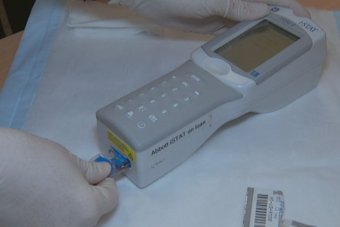People in remote areas may not need to be medically evacuated or travel for medical testing and treatment following research into on-site pathology-testing.
Flinders University runs programs in remote communities where small devices can deliver instant blood test results for people with acute chest-pain, diarrhoea and renal failure.
The university has been given a $95,000 Emergency Medicine Foundation (EMF) grant to research the benefit of the point-of-care testing (POCT) program in six remote Northern Territory communities.
Professor Mark Shephard from Flinders University said POCT could assist doctors to either rule out a potential acute problem, to stabilise the patient in their own community, or confirm if an emergency evacuation was required.
He hoped the research would ensure the roll-out of the technology in more areas meaning fewer people would have to be rushed to a major hospital for tests.
Hundreds of rural and remote Australians are medically evacuated to city hospitals each year at a significant cost to the health system.
Professor Mark Shephard
“That’s a very costly exercise so if the point-of-care testing can provide immediate information that enables the patient to be stabilised on site, then the medical evacuation isn’t needed and therefore there’s considerable cost savings,” Professor Shephard said.
“Hundreds of rural and remote Australians are medically evacuated to city hospitals each year at a significant cost to the health system.
“The average cost of an aerial evacuation from a remote area of Queensland is $8,318 and prior research has found that there is one evacuation every 2.2 days in remote Northern Territory.”
EMF chairperson Dr Peter Aitken said the research submission from Professor Shephard’s centre was selected from more than 160 applications submitted from every state and territory in Australia.
“Combined, 160 applications sought more than $11 million in research funding, which demonstrates a real need for medical research across a whole range of areas in remote and rural Australia,” Dr Aitken said.
“One real value of POCT is that it enables local doctors to treat patients earlier before a retrieval team has arrived.”

